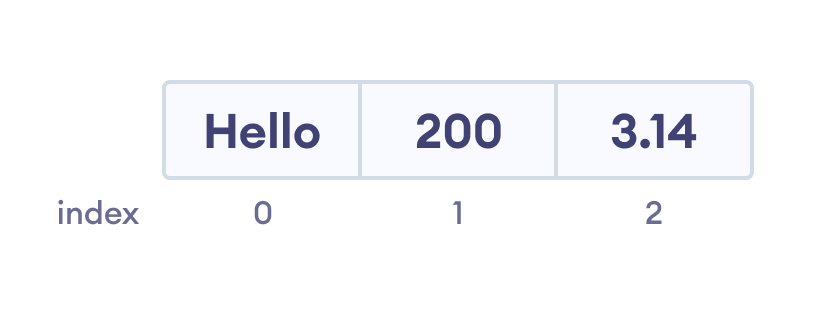A tuple in Rust allows us to store values of different data types. For example,
let tuple = ('Hello', 5, 3.14);
Here, we have used the small bracket ( ) to create a tuple and it is able to store a string value, Hello, an integer value, 5, and a floating-point value 3.14 together.
Note: In Rust, tuples have a fixed size and cannot grow or shrink after they have been created.
Creating a Tuple in Rust
In Rust, we can create a tuple in two different ways:
- Tuple with data type
- Tuple without data type
Let's understand each of them in detail.
Rust Tuple with Data Type
While creating a tuple, we can mention the type of data it is storing. For example,
// create a tuple with data type
let student_info: (&str, u8, f32) = ("Ricky", 21, 3.56);
Here,
let student_info: (&str, u8, f32)- specifies the variable name and the data types of the tuple elements("Ricky", 21, 3.56)- specifies the elements of the tuple
Example: Tuple with Data Type
fn main() {
// initialization of tuple with data type
let tuple: (&str, f32, u8) = ("Rust", 3.14, 100);
println!("Tuple contents = {:?}", tuple);
}
Output
Tuple contents = ("Rust", 3.14, 100)
Note: We use the :? in the println! function to print an entire tuple.
Tuple without Data Type in Rust
We can create a tuple without mentioning the type of data it is storing. The Rust compiler can automatically detect and set the data type. For example,
// create a tuple without data type
let student_info = ("Ricky", 21, 3.56);
Here,
let student_info- specifies the variable name of the tuple("Ricky", 21, 3.56)- specifies the elements of the tuple
Example: Tuple without Data Types
fn main() {
// initialization of tuple without data type
let tuple = ("Rust", "fun", 100);
println!("Tuple contents = {:?}", tuple);
}
Output
Tuple contents = ("Rust", "fun", 100)
Accessing Elements in a Tuple
Each element in a tuple is associated with a unique sequence of numbers. This number is known as the tuple index or just index.
Suppose we have a tuple,
let random_tuple = ("Hello", 200, 3.14);
The tuple indexes of the random_tuple look like,

In Rust, we can access individual tuple elements using their corresponding tuple indexes and the dot . notation. For example,
random_tuple.0- access the element at index 0 (first element)random_tuple.1- access the element at index 1 (second element)random_tuple.2- access the element at index 2 (third element)
Example: Access Tuple Elements
fn main() {
let random_tuple = ("Hello", 200, 3.14);
// accessing tuple element at index 0
println!("Value at Index 0 = {}", random_tuple.0);
// accessing tuple element at index 1
println!("Value at Index 1 = {}", random_tuple.1);
// accessing tuple element at index 2
println!("Value at Index 2 = {}", random_tuple.2);
}
Output
Value at Index 0 = Hello Value at Index 1 = 200 Value at Index 2 = 3.14
Note: The tuple index always starts at 0; hence the first element of the tuple is at position 0, not 1.
Mutable Tuple
In Rust, a tuple is immutable, which means we cannot change its elements once it is created.
However, we can create a mutable array by using the mut keyword before assigning it to a variable. For example,
// create a mutable tuple
let mut mountains = ("Everest", 8848, "Fishtail", 6993);
Now, we can make changes to this tuple.
Let's take a look at an example,
fn main() {
// initialize a mutable tuple
let mut mountain_heights = ("Everest", 8848, "Fishtail", 6993);
println!("Original tuple = {:?}", mountain_heights);
// change 3rd and 4th element of a mutable tuple
mountain_heights.2 = "Lhotse";
mountain_heights.3 = 8516;
println!("Changed tuple = {:?}", mountain_heights);
}
Output
Original tuple = ("Everest", 8848, "Fishtail", 6993)
Changed tuple = ("Everest", 8848, "Lhotse", 8516)
Here, we create a mutable tuple named mountain_heights. We then change its 3rd and 4th element, the 2nd and 3rd tuple index.
mountain_heights.2 = "Lhotse";
mountain_heights.3 = 8516;
Note: You can only change the element of a tuple to the same type as when it was created. Changing data types is not allowed after tuple creation.
Destructuring a Tuple
We can break down tuples into smaller variables in Rust, known as destructuring.
Suppose we have a tuple,
let tuple = ("John Doe", 18, 178);
Now, we can perform destructuring using,
let (name, age, height) = tuple;
Now, we access the name, age and height variables directly without using tuple indexes.
nameinstead oftuple.0ageinstead oftuple.1heightinstead oftuple.2
You can name the variables as you like while destructuring a tuple.
Note: Destructuring a tuple is also known as tuple unpacking.
Example: Destructuring a Tuple
fn main() {
let mixture = ("Hello, World!", 16, 2.71828);
// destructuring a tuple
let (message, number, float) = mixture;
println!("message = {}", message);
println!("number = {}", number);
println!("float = {}", float);
}
Output
message = Hello, World! number = 16 float = 2.71828
Here, we destructure the tuple mixture to variables message, number and float.
let (message, number, float) = mixture;
Finally, we print these variables to the screen.